And Mr Nicolás Maduro? Better than ever, thanks to the opposition. For some time now “opposition” has been an empty word in Venezuela, but this week it became absolutely explicit when former presidential candidate Henrique Capriles, one of the leaders of the Mesa de Unidad Democrática (Democratic Unity Roundtable, MUD) coalition, pulled out.
The reason? Four of the opposition’s five successful gubernatorial candidates in the October 15 regional elections – all of whom belong to the traditional centre-left Accion Democrática (Democartic Action) party led by Henry Ramos Allup – were sworn in by the National Constituent Assembly, whose legitimacy has been rejected by MUD. The fifth, belonging to Capriles’ Primera Justicia (Justice First, PJ) party, was dismissed by the Maduro regime after refusing to pledge allegiance to the Assembly.
Taking advantage of the building momentum, Mr Maduro called on Thursday municipal elections to be held in December. A casebook example of “divide and rule” before our very eyes. And here we come back to the first question posed in this newspaper’s very first LatAm Watch column on September 2: with a splintered opposition, is there a way out for Venezuela? “Administering defeats is always complicated,” former MUD secretary-general Jesús “Chúo” Torrealba told the Times. He compares the current situation to 2004, when the opposition – after being defeated in a recall referendum called by Hugo Chávez – failed to understand the reasons for the failure, claimed fraud and decided to boycott the 2005 legislative elections. Something similar happened between 2016 and 2017, says Torrealba, who guided the MUD into the legislative elections of late 2015, when the opposition triumphed with twothirds of the vote.
“A lack of strategy in the opposition, giving way to short-term tactics, leading to struggles which were not exactly peaceful or electoral,” adds the ex-MUD secretarygeneral. But Torrealba’s main concern is that Maduro has discovered a sinister formula: “When there is hunger and dictatorship, whoever controls the hunger also controls the vote.” “He managed to replace the charisma, which he failed to inherit from Chávez, with the Carnet de la Patria identification document coded QR,” he adds. Thus “whoever failed to renew their Carnet de la Patria when voting on October 15 [which could be done at tables adjacent to the polling-booths] went without food.”
Almost all of Maduro’s electoral base went out to vote, while the followers of the opposition did not. And this was only part of the game: the government had institutionalised fraud, switching the location of the voting centres and altering voting rolls.
“Almost a million voters did not know where to go so, in the face of such tricks, the opposition pulled out of the race,” recalls Torrealba. “It’s a tremendously dangerous situation: on the one hand, an atomised opposition which trades blame and looks like a cluster of fan clubs behind the respective leaders and on the other, Maduro, who apart from electoral fraud has turned hunger into his mode of governance.” Vis-à-vis this scenario, what about international pressure? The Times also consulted a source close to the Organisation of American States (OAS) in Washington, the multilateral organism that has been most vocal on Venezuela. They responded that “the current situation is extremely dangerous with Maduro reloaded, the opposition leaderless and worse still, with immense uncertainty among the opposition politicians in executive posts.”
“There will be no solution while there are not at least minimal agreements for coexistence and leadership within the opposition,” is Torrealba’s gloomy conclusion. “A leader must be found quickly, within this fortnight,” he warns. The OAS source says that they are ready to offer immediate support if a black horse emerges from among the opposition debris.
The Venezuelan Supreme Court’s chief justice, Miguel Angel Martin, currently in exile in Washington, also spoke with the Times. Mr Martin is one of the 33 judges that were chosen by the opposition-led National Assembly on July 21, 2017. On that very same night the political police of the Maduro regime jailed one of the judges (he was released this week) and knowing that they were next in line, the rest of the appointees sought refuge in the embassies of Brazil, Mexico, Panama and Chile. Nearly all of recently nominated judiciary went underground or into exile. Shortly afterwards, on July 30, the members of the National Constituent Assembly that had fraudulently replaced the National Assembly also replaced the exiled judges with the previous nominees.
Of the 33 judges, 11 are now in the United States, two in Panama, six in Colombia and the rest remain holed up in the embassies. “We are the Supreme Court designated by the National Assembly, legitimately elected in December, 2015, when 6.7 million Venezuelans voted for a change of government,” says Martin. “We have declared the National Constituent Assembly dissolved after it was established on the basis of a flawed procedure with the sole intention of fraud without having called a plebiscite beforehand,” he adds. Therefore, he continues, “we call for Article 350 of the Constitution, referring to peaceful civil resistance, to be revived so that every citizen has the duty to repudiate, disobey and resist every action against our country and its fundamental rights.” Translation: besides the vacuum in the opposition, Venezuela has two Judiciaries and two Legislatures, while the Supreme Court in exile and not in office calls for resistance.
Judge Martin insists that “we will use all the legal instruments [at our disposal] so that the regime can be replaced by the true representatives of Venezuelan society.” But this journalist wonders if the search for an opposition and its leader has even really started. And Mr Maduro? Well, he’s just better than ever.
















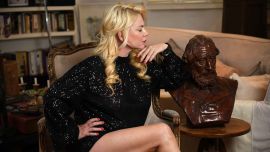
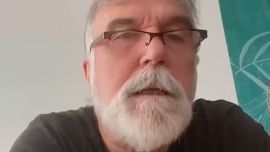
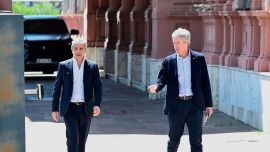
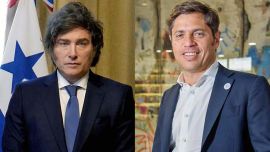
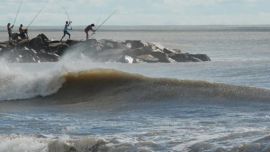
Comments